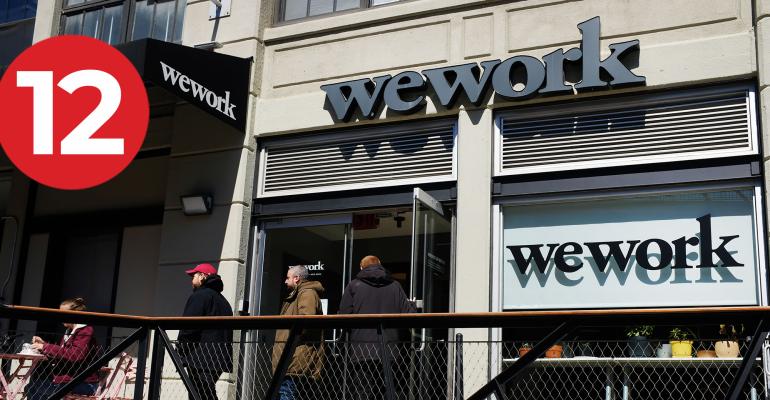- Squeezed Property Owners Put Their Faith in the Fed “Interest rate cuts can’t come fast enough for landlords who grew addicted to cheap money in recent years. Between now and the end of 2025, $390 billion of securitized commercial real-estate debt matures and needs to be refinanced at higher rates. Another wave of bank debt also comes due.” (The Wall Street Journal)
- WeWork’s Creditors Extend Far Beyond Its Landlords “The New York-based global flexible workplace provider's creditors include major financial services firms such as JPMorgan Chase, Goldman Sachs, Barclays Capital, Morgan Stanley and BlackRock, according to a ‘Certificate of Service’ filing made on behalf of WeWork to the U.S. Bankruptcy Court for the District of New Jersey on Tuesday.” (CoStar)
- Is the Commercial Real Estate Panic Overblown? “Analysis from Fidelity Investments suggests that despite the challenging backdrop, fundamentals in the commercial real estate space remain sound. Except for offices, demand remains strong enough to boost rental rate growth across the sector. Funds From Operations per share growth, a common metric of fundamental strength in the space, remains close to the average of the last five years, at 5.8% as of 9/30.” (Vetta Fi)
- Navigating Interest Rates, Depreciation, & Tax Changes: A Real Estate Year-End Overview “Real estate owners and operators are experiencing increased headwinds across all real estate asset classes as they face changes to various tax rules, adjust to the post-COVID real estate market, and deal with the current interest rate environment. In these dynamic times, it remains important to stay current on the latest developments in the industry to make the best decisions as an owner or operator in the field.” (Marcum)
- David Lipson Taking Helm as Savills North America CEO “David Lipson will be taking over for Mitchell Rudin as CEO of Savills North America as the latter will focus on his current position of chairman of the brokerage’s North American arm.” (Commercial Observer)
- BREAKING: CMS finalizes transparency rule targeting REITs, private equity owners “The rule imposes many of the ownership transparency measures outlined in a February proposal and defines both private equity and real estate investment trust owners. Nursing homes will have to disclose the involvement of such owners upon initial enrollment and revalidation and during any change of ownership.” (McKnight’s Long-Term Care News)
- Exploring Alternative Investment Opportunities “In recent years, alternative sectors have grown into a significant share of Commercial Real Estate (CRE) investment, totaling $289 billion in transaction volume from 2020 to 2023—a 79% increase. During that time period, 39% of capital raised has included alternatives as target sectors.” (Cushman & Wakefield)
- 'A Bloodbath': Reckoning For Rent-Stabilized Apartment Owners Starting To Set In “The strain of a restricted rent roll that isn’t keeping pace with increased costs is beginning to show. Delinquency rates for loans backed by rent-stabilized buildings are on the rise, some rent-stabilized portfolios have traded for huge discounts, and others have faced foreclosures.” (Bisnow)
- How does syndicated real estate work? “Syndication in real estate is a partnership among a group of investors who pool their money to invest in larger properties they would be unable to afford individually. These partnerships can also create larger investment opportunities such as industrial real estate or multi-family properties.” (MPA)
- PREIT Posts Quarterly Loss As Clock Ticks On $1B Debt “Another bankruptcy is a distinct possibility for the company, which specializes in retail properties, Grodsky said. The company might consider selling assets, though buyers would be hard to find. So far this year, the company has sold assets for about $30M.” (Bisnow)
- Why Hotel-Branded Residences Are a Hit “Lately, according to JLL analysis, developers and investors looking to expand their businesses in the luxury segment have been increasingly focusing on standalone branded residential projects, mainly due to the financial benefits delivered to all stakeholders.” (Multi-Housing News)
- Medical Office's New Twist Is Flex Space “There are the costs of equipment and buildout, nursing staff management, appointment and billing management, cleaning, maintenance, and the price of real estate in a desirable location with easy access to parking. If a coworking space is doing billing, it may already be credentialed with insurance companies, a process that could otherwise take months before being able to request payment.” (GlobeSt.com)
1 comment
Hide comments





